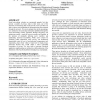Free Online Productivity Tools
i2Speak
i2Symbol
i2OCR
iTex2Img
iWeb2Print
iWeb2Shot
i2Type
iPdf2Split
iPdf2Merge
i2Bopomofo
i2Arabic
i2Style
i2Image
i2PDF
iLatex2Rtf
Sci2ools
115
click to vote
SOUPS
2009
ACM
2009
ACM
flyByNight: mitigating the privacy risks of social networking
Social networking websites are enormously popular, but they present a number of privacy risks to their users, one of the foremost of which being that social network service providers are able to observe and accumulate the information that users transmit through the network. We aim to mitigate this risk by presenting a new architecture for protecting information published through the social networking website, Facebook, through encryption. Our architecture makes a trade-off between security and usability in the interests of minimally affecting users' workflow and maintaining universal accessibility. While active attacks by Facebook could compromise users' privacy, our architecture dramatically raises the cost of such potential compromises and, importantly, places them within a framework for legal privacy protection because they would violate a user‟s reasonable expectation of privacy. We have built a prototype Facebook application implementing our architecture, addressing s...
Legal Privacy Protection | Privacy Risks | Security Privacy | Social Networking Website | SOUPS 2009 |
Related Content
| Added | 28 May 2010 |
| Updated | 28 May 2010 |
| Type | Conference |
| Year | 2009 |
| Where | SOUPS |
| Authors | Matthew M. Lucas, Nikita Borisov |
Comments (0)

